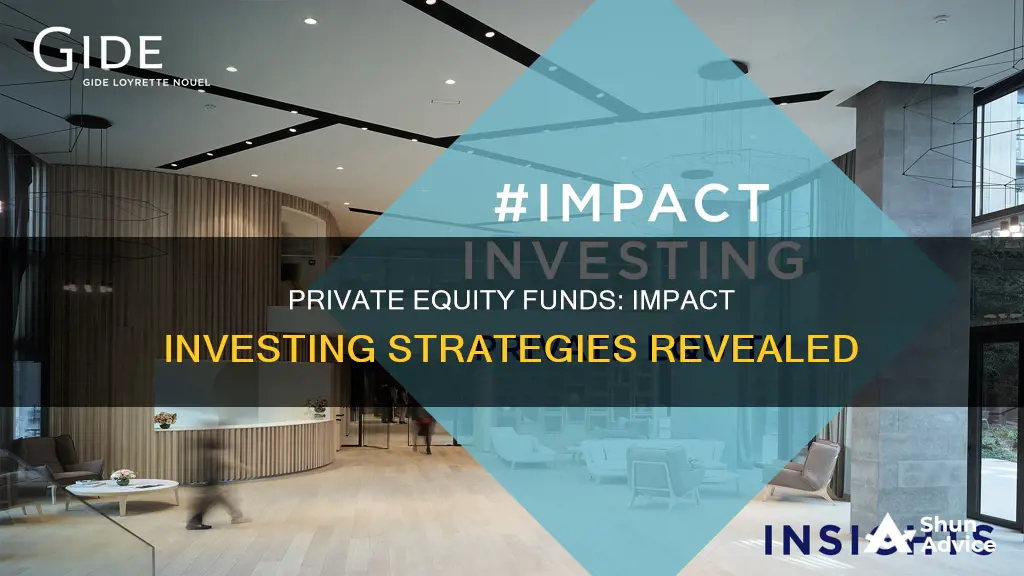
Private equity funds are increasingly adopting impact strategies, with more than half of all impact funds now falling into this category. Impact investing is an extension of socially responsible investing, which focuses on companies that promote ethical and socially responsible consciousness, such as environmental sustainability, social justice, and corporate ethics. It actively seeks investments that can create a significant, positive impact, while still generating a financial return. This has proven popular with investors who want to make a difference in the world and could potentially produce stronger returns in the long run. The Global Impact Investing Network calculates that the market is now worth $1.2tn.
| Characteristics | Values |
|---|---|
| Type of investment | Private equity funds are investing in companies that are not listed publicly. |
| Objective | Achieving a financial return alongside positive social and environmental outcomes |
| Strategies | Venture capital, growth capital, and buyout |
| Top targeted Sustainable Development Goals | SDG 3 Good Health and Well-being, SDG 7 Affordable and Clean Energy, SDG 9 Industry, Innovation and Infrastructure, SDG 4 Quality Education and SDG 8 Decent Work and Economic Growth |
| Top impact investing firms | Vital Capital, Triodos Investment Management, the Reinvestment Fund, BlueOrchard Finance S.A., and the Community Reinvestment Fund, USA |
| Regulatory scrutiny | The European Securities and Markets Authority (Esma) has proposed that funds using "impact" in their names must make clear how they generate a positive and measurable social or environmental impact. |
What You'll Learn
- Private equity funds are the most popular asset class for impact investors
- Impact investing is evolving from a niche to a mainstream force
- Climate-related deals are increasing
- Impact investing is becoming more structured and standardised
- Regulatory schemes are being developed to address greenwashing concerns

Private equity funds are the most popular asset class for impact investors
The rise in impact investing has attracted interest from large private equity investors, who are launching their own impact funds. These funds actively seek out businesses that deliver measurable social or environmental benefits, rather than simply screening out companies that do not meet environmental, social, and governance (ESG) criteria.
Some of the biggest private equity firms offering impact funds include TPG, KKR, and Carlyle. TPG, for example, has raised $7.3bn for a climate-focused impact fund, while KKR has raised almost $2bn for its second impact fund.
The popularity of impact investing has led to increased competition and regulatory scrutiny, with critics questioning the social impact claims made by some firms. To address these concerns, the World Bank's International Finance Corporation has called on asset managers to disclose their impact investing methods and have their alignment with best-practice principles independently verified.
Despite the challenges, private equity investors continue to adopt impact strategies, recognising the interconnectedness of environmental and social issues. By providing capital to businesses in areas such as renewable energy, healthcare, and financial inclusion, they aim to catalyse and scale impact while also generating financial returns.
Index Funds: How Much Should You Invest?
You may want to see also

Impact investing is evolving from a niche to a mainstream force
According to Michael Fiebig, head of private equity at specialist emerging markets asset manager responsAbility, impact investment has evolved from a niche with great ideas and ambitions into a mainstream force. This shift is reflected in the scale and volume of impact private equity.
The influx of funds into impact investment has attracted major private equity firms, which are increasingly introducing impact investment funds. For instance, last year, KKR raised nearly $2 billion for its second impact fund, while TPG closed its Rise Climate Fund at $7.3 billion, backed by investors like the Ontario Teachers' Pension Plan and AXA.
The growing interest in impact investing among institutional investors is driving these fund launches. Maggie Loo, partner, client & strategy development at specialist private markets investor Bridges Fund Management, observes that institutional capital is becoming much more interested in impact, and this interest is permeating throughout the ecosystem. Loo predicts that it will become standard practice for fund managers to demonstrate contributions towards addressing environmental and social challenges, and capital allocators are likely to consider this when deciding which managers to collaborate with.
The focus of impact investing has evolved from primarily social endeavours to include a strong emphasis on the climate agenda. This shift is evident in the private equity sector, with climate-related deals increasing by nearly 7% in the past year, according to McKinsey & Company. Larger private equity firms are leveraging their resources and scale towards climate investing, alongside smaller, climate-focused companies that centre climate impact in their investment strategies.
The interconnectedness of environmental and social issues is also being recognised by asset owners. Marc Romano, head of impact private equity at Mirova, notes that there is a common understanding that a successful environmental transition requires a proper transition of society. Mirova is gearing up to launch a new social impact strategy in the first half of 2024, focusing on social outcomes in education, health, well-being, and financial inclusion.
The evolution of impact investing from a niche to a mainstream force is evident in the growing number, maturity, and diversification of private equity impact funds. Private equity funds currently make up a significant portion of the funds tracked by various databases and are expected to remain a dominant asset class, accounting for a substantial percentage of current fundraising.
As impact investing gains momentum, regulatory and market scrutiny is increasing, leading to more sophisticated efforts by private equity investors to demonstrate the impact of their investments. Standardisation is emerging in how the industry evaluates impact, and certification or audits are increasingly sought after to validate impact claims and ensure transparency.
While challenges remain, particularly in measuring social impact, the evolution of impact investing from a niche to a mainstream force is undeniable. The growing interest from institutional investors, the entry of major private equity firms, and the increasing sophistication and standardisation of impact measurement and reporting all contribute to the mainstreaming of impact investing.
Savings Strategy: Mutual Funds Investment Allocation
You may want to see also

Climate-related deals are increasing
Private equity investors are increasingly adopting impact strategies, with more than half of all impact funds in the Phenix Capital database being private equity funds. This shift towards impact investing in the private equity space is reflected in the rise of climate-related deals, which have increased by nearly 7% in the past year, according to McKinsey & Company.
Large private equity firms are leveraging their resources and scale towards climate investing, alongside smaller, climate-focused companies that centre climate impact in their investment strategies. For example, TPG, a Texas-based private equity firm, has raised $7.3 billion for its Rise Climate Fund, while KKR has raised nearly $2 billion for its second impact fund.
The growth in impact investing has attracted interest from some of the world's largest private equity investors, turning it into its own asset class. This trend is expected to continue, with institutional capital becoming more interested in impact investing and seeking to address environmental and social challenges.
Private equity impact funds have grown substantially in number, maturity, and diversification since 2015. Within the private equity asset class, venture capital makes up 44%, followed by growth at 35%, and buyout at 21%. Impact investing in private equity seeks to achieve financial returns alongside positive social and environmental outcomes.
The Mindset of Investment Fund Managers: Traits and Insights
You may want to see also

Impact investing is becoming more structured and standardised
Impact investing is becoming increasingly structured and standardised, with greater regulatory and market scrutiny. This evolution is driven by the growing popularity of impact investing, particularly within private equity, and the need to differentiate between impact-driven and traditional investment strategies.
Michael Fiebig, a specialist in emerging markets asset management, observes that impact investing has evolved from a niche to a mainstream force. This shift is evident in the scale and volume of impact private equity, with major firms launching dedicated impact funds. The influx of capital into impact investing has caught the attention of regulators, who are now scrutinising the industry more closely.
To demonstrate the impact of their investments, private equity investors are engaging sustainability professionals at every stage of the investment process. They are also seeking certification or audits to validate their impact claims and ensure transparency. This trend towards standardisation and structure is a response to the increasing sophistication of impact investing and the need to provide clear metrics and measurements for evaluating success.
Additionally, some private equity players are introducing financial structures that link performance-based compensation to impact outcomes. This approach assesses investors' commitment to their impact claims and helps maintain the focus on generating financial returns alongside social or environmental impact.
However, there are challenges to standardising impact investing. Bruce Usher, a professor at Columbia Business School, notes that measuring social benefits can be difficult, and it may not be possible to solve this challenge quickly. Furthermore, there is a risk of blurring the lines between impact investing and ESG (environmental, social, and governance) investing, as the two concepts become increasingly interconnected.
Despite these complexities, the trend towards greater structure and standardisation in impact investing is likely to continue as investors, regulators, and the public demand more transparency and accountability from the private equity industry.
Bond Fund Investment: What Percentage is Smart to Invest?
You may want to see also

Regulatory schemes are being developed to address greenwashing concerns
Private equity funds are increasingly adopting impact investment strategies, with more than half of all impact funds in the Phenix Capital database being private equity funds. As impact investing gains popularity, regulatory schemes are being developed to address concerns about greenwashing.
Regulatory schemes to address greenwashing concerns
Europe
The European Union has the most advanced regulatory environment to address greenwashing concerns. Some of the key regulations include:
- Sustainable Finance Disclosure Regulation (SFDR): This regulation aims to address ambiguity around "sustainable" product labels by imposing disclosure requirements for a range of ESG metrics at both entity and product levels. It establishes three categories of funds with varying demands for sustainability considerations and reporting.
- EU Taxonomy: This framework outlines six environmental objectives and four conditions that an economic activity must meet to qualify as environmentally sustainable. It helps asset managers design credible green products that meet common standards.
- Corporate Sustainability Directive (CSRD): The CSRD strengthens reporting and disclosure requirements for climate and environmental performance, mandating firms to obtain third-party assurance on sustainability claims and quantify their environmental reporting.
North America
While the US has less advanced regulations, steps are being taken to address greenwashing concerns. The SEC has updated the Names Rule to prevent funds from misrepresenting their investments and risks, and established the Climate and ESG Enforcement Task Force to proactively identify ESG-related misconduct.
Asia-Pacific
Several countries in the Asia-Pacific region are also taking steps to combat greenwashing:
- Singapore: Singapore introduced its Green Labelling Scheme in 1992 to help consumers identify environmentally friendly products. It also plans to align with the International Sustainability Standards Board's standards, mandating climate reporting for listed issuers and large non-listed companies.
- Malaysia: Malaysia has developed a Taskforce on Climate-Related Financial Disclosures application guide to improve the coverage and quality of climate risk disclosures within the financial services sector.
- Japan: The Financial Services Agency has introduced new rules restricting the use of ESG-related terms to funds that consider ESG as a "key factor" in investment choices.
- Hong Kong: The Hong Kong Securities and Futures Commission has issued a circular mandating collective investment scheme managers to assess climate-related risks and make disclosures regarding their methodologies for ESG-oriented funds.
- China: The local China Banking and Insurance Regulatory Commission of Jiang Su office proposed guidance for developing green finance, encouraging banking institutions to improve their assessment of green financial organizations.
Impact of regulatory schemes
These regulatory schemes are having a significant impact on businesses and investors. They are raising the bar for transparency and disclosure, requiring companies to provide clear and accurate information about their environmental practices and claims. Non-compliance can result in legal consequences, including fines and reputational damage. As such, businesses must stay vigilant and well-versed in the latest regulations to ensure their marketing and investment strategies accurately represent their ESG credentials.
Frequently asked questions
Impact investing is an extension of socially responsible investing (SRI), which focuses on companies that promote ethical and socially responsible consciousness, such as environmental sustainability, social justice, and corporate ethics. Impact investing goes a step further by actively seeking investments that can create a significant, positive impact.
Impact investing focuses on investing in companies or organizations to create a measurable societal benefit, while still generating a financial return. Popular issues to target include environmental damage, poverty, and education. For example, Vital Capital is a private equity fund that invests in developing areas, such as sub-Saharan Africa, in businesses and projects designed to enhance quality of life and offer substantial investment returns.
Private equity funds are investing in impact to meet investor demand for impact and to demonstrate their contributions towards addressing environmental and social challenges. As impact investing has grown, it has become its own asset class, attracting interest from large private equity investors.







